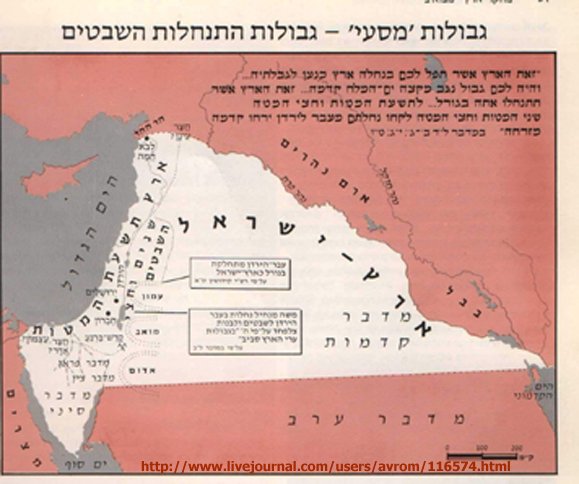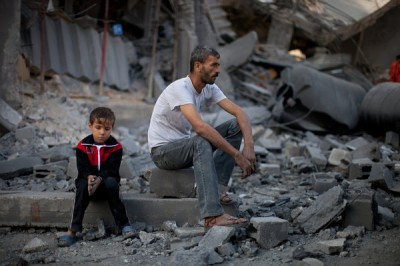21st Century Wire says…
The latest assessment from the international aid charity Oxfam paints a harrowing picture of the state of Palestine’s Occupied Territories. The wanton destruction of Gaza this past summer by Israel’s IDF left nearly 2,500 dead, with thousands of others injured and at least 50,000 homeless. It was a shameful abuse of power by anyone’s measure.
Oxfam International has concluded that ‘rebuilding’ in places like Gaza could take up to a century (see commentary on their report below). But this is only if Palestinians residing in their current location will survive 100 years to tell their epic tale. As it stands, certain leading Israelis are on record as not factoring in any Palestinians to be around by then.
What the Oxfam does not mention, but should really be a paramount subject when discussing the Palestinian issue, is the radical plan for the formation of a “Greater Israel”, also referred to as, “The Promised Land”. Not all Israelis support this concept, but it still has substantial support in powerful political circles internationally.

“On 04 September 2001 a demonstration was held in Jerusalem to support of the Idea of the State Israel from the Nile to the Euphrates. It was organised by the movement Bead Artzein (“For the Homeland”), headed by rabbi and historian Avrom Shmulevic from Hebron. According to Shmulevic, “We shall have no peace as long as the whole territory of the Land of Israel will not return under Jewish control…. A stable peace will come only then, when Israel will return to itself all its historical lands, and will thus control both the Suez and the Ormudz channel…. We must remember that Iraqi oil fields too are located on the Jewish land.” (Source: Global Security.org)
This is where fundamentalist religion meets geopolitical ambition, and according to Professor Michel Chossudovsky, and referencing the work of the late Israeli scholar Israel Shahak, this neocolonial idea is, “the cornerstone of powerful Zionist factions within the current Netanyahu government, the Likud party, as well as within the Israeli military and intelligence establishment.“
“According to Rabbi Fischmann, “The Promised Land extends from the River of Egypt up to the Euphrates, it includes parts of Syria and Lebanon.”
Naturally, the existence of this as a dominant fundamentalist ideology within certain influential Zionist circles in Israel, Europe and North America, poses some serious problems with the current peace process, and the expectation that Palestinians will be allowed to live within a new “Greater Israel”. Not surprisingly, this is not a very popular topic of discussion in US political circles because if it’s fully acknowledged then it more or less renders all the current political maneuvering null and void. In Americaspeak, the Zionist concept of a “Greater Israel”, is identical to the 19th century American tenet of “Manifest Destiny” set forth by the likes of Andrew Jackson in order to existential support newly emerging cultural and nationalist attributes like, “American Exceptionalism”, albeit, at the expense of the indigenous natives. Israel has merely borrowed this same fundamentalist, nationalist ideology, only the newer version is super-charged with a potent mixture of religious and racial zeal, interpreted from sacred scriptures as being “Promised by God” and so forth. When you consider Gaza and the West Bank in the context of America’s Indian Reservation system and other similar Bantustan systems of subjugating natives population globally, then the reality of Palestine today makes perfect sense.
One thing should be obvious by now: Israel’s own 65 year old reservation system aka ‘the occupied territories’ (Palestine) is not sustainable – not from a humanitarian standpoint, or from a political one. Its mere existence is the primary reason why Israel is losing the PR battle for hearts and minds globally. If Israel were ever able to resolve this in a just manner, it would improve their image internationally by orders of magnitude, but sadly, too many powerful forces in the US, Europe and within Israel itself seek to preserve the status quo.
Chossudovsky continues, “According to Mahdi Darius Nazemroaya in a 2011 Global Research article, ‘The Yinon Plan’ was a continuation of Britain’s colonial design in the Middle East:
“[The Yinon Plan] is an Israeli strategic plan to ensure Israeli regional superiority. It insists and stipulates that Israel must reconfigure its geo-political environment through the balkanization of the surrounding Arab states into smaller and weaker states.
Looking at The Yinon Plan, you get the strange feeling that you are reading a facsimile of Washington DC’s foreign policy and intervention record over the last 25 years.
Oxfam’s findings are truly shocking, but does it paint the whole picture? In order to understand where Palestine sits within this 21st century geopolitical matrix, it is crucial to also understand the key underlying existential beliefs and goals of the dominating power in the region, Israel.
The absence of this key context still leaves a gaping hole in Oxfam’s rounding assessment of Gaza…

(Image Source: Global Research)
Gaza Rebuild Effort Could Take 100 Years: Oxfam
Andrea Germanos
Common Dreams
Despair and destruction continue to envelop the blockaded Gaza strip, where the rebuilding of vital structures could take up to a century, Oxfam International has warned.
The organization’s statement comes six months after a ceasefire agreement ended Israel’s 50-day assault on Gaza, which left over 2,100 Palestinians dead, decimated thousands of structures, and weakened already damaged infrastructure systems.
Oxfam is one of 30 international aid agencies that operate in Gaza, including the Norwegian Refugee Council and United Nations Relief and Works Agency (UNRWA), to issue a joint statement Thursday expressing alarm at the slow pace of reconstruction and worsening living conditions for Gaza’s residents.
Among the families hit by the destruction this summer was that of Abdel Momen Abu Hujair, who farms in Johr El-Diek. His wife, Um Mohammed, told the Norwegian Refugee Council:
Is this what our lives have come into? Living in a shack after we invested all what we had to build a house? I am very depressed and feel unable to take care of my children. I used to help them with their studies; their performance at school is now deteriorating. I feel no hope for the future or reconstruction. I am afraid we will spend the rest of our lives in this shack, in suffering and despair.
In their joint statement, the organizations lay out some of the ongoing problems:
Since July, the situation has deteriorated dramatically. Approximately 100,000 Palestinians remain displaced this winter, living in dire conditions in schools and makeshift shelters not designed for long-term stay. Scheduled power cuts persist for up to 18 hours a day. The continued non-payment of the salaries of public sector employees and the lack of progress in the national unity government further increases tensions. With severe restrictions on movement, most of the 1.8 million residents are trapped in the coastal enclave, with no hope for the future.
Bearing the brunt of this suffering are the most vulnerable, including the elderly, persons with disabilities, women and nearly one million children, who have experienced unimaginable suffering in three major conflicts in six short years. Children lack access to quality education, with over 400,000 of them in need of immediate psychosocial support.
The statement adds that “Israel, as the occupying power, is the main duty bearer and must comply with its obligations under international law,” and concludes: “We must not fail in Gaza.”
In an update earlier this month, UNRWA said a funding shortfall had forced it “to suspend its cash assistance program supporting repairs and providing rental subsidies to Palestine refugee families in Gaza,” and Oxfam pointed to the responsibility of the international community as well.
“Only an end to the blockade of Gaza will ensure that people can rebuild their lives,” Catherine Essoyan, Oxfam’s Regional Director, said in a media statement.
“Families have been living in homes without roofs, walls or windows for the past six months. Many have just six hours of electricity a day and are without running water. Every day that people are unable to build is putting more lives at risk. It is utterly deplorable that the international community is once again failing the people of Gaza when they need it most,” Essoyan stated.
But Electronic Intifada co-founder Ali Abunimah writes that little change to the dire situation will come if aid agencies continue to make appeals to the vague “international community” and avoid putting blame on “the home governments of many of the international civil society organizations have been complicit in Israel’s military attacks and siege on Gaza.”
He continues: “Aid agencies should not have waited six long months to speak out. Now that they have done so, they should have called for specific punitive measures against the party they correctly call the ‘occupying power’ to force it to end its siege.”
“Israel, moreover, could not carry on the way it does without the complicity of ‘Western’ governments: the aid agencies should hold their governments accountable and pressure them to end their complicity,” Abunimah writes.
Human rights organizations Amnesty International and Human Rights Watch have issued reports finding that some of Israel’s actions during the summer assault amounted to war crimes, but the head of a UN war crimes inquiry into the operation announced his resignation this month, stating: “This work in defense of human rights appears to have made me a huge target for malicious attacks.”
This work is licensed under a Creative Commons Attribution-Share Alike 3.0 License
READ MORE ISRAEL NEWS AT: 21st Century Wire Israel Files
–















